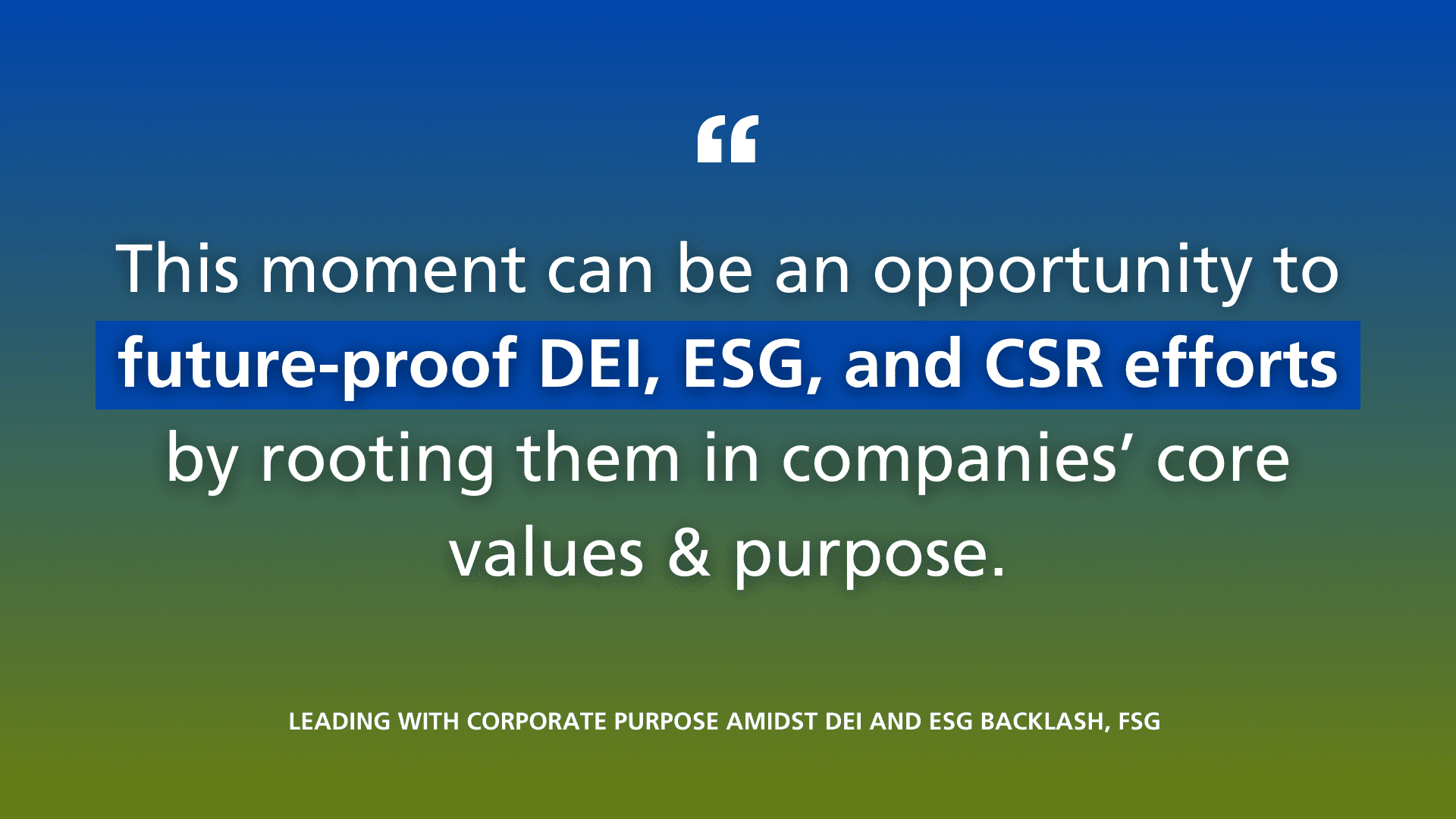
Embracing DEI and ESG principles within companies has proven crucial to their success. Countless studies, including a 2020 McKinsey research report, have repeatedly found that gender and ethnically diverse companies are more likely to outperform those with a more homogenous workforce. However, many corporate leaders are concerned about legal repercussions following the Supreme Court’s ruling on affirmative action. While the ruling targeted the education sector, corporate changemakers who work in DEI, ESG, and CSR are facing pressure from a range of conservative advocates to end their corporate initiatives aimed at reducing inequities.
The threat of lawsuits have prompted mixed responses from companies. Some companies are discreetly scaling back their initiatives to avoid scrutiny, despite their 2020 public commitments to DEI in the wake of the murder of George Floyd and racial and social justice movements around the country. Language around DEI and ESG is disappearing through rebranding efforts, as companies are quietly removing publicly available information on these issues from their websites. Instead, many are adopting umbrella terms like “responsible business” to describe their work moving forward. This pivot in attention has left some corporate changemakers to question whether their leadership is still supportive of the work, as fatigue sets in and changes start to feel more “generic”. Tech giants like Google and Meta have been sunsetting early career and apprenticeship programs, as well as removing internal learning opportunities aimed at supporting underrepresented groups, as anti-DEI threats grow and layoffs continue. On the other hand, some companies are vowing to intensify their efforts, despite any changes in language, with 57% of C-suite executives increasing their efforts on DEI in the last year.
Despite the challenges of today’s polarized political climate, this moment can be an opportunity to future-proof DEI, ESG, and CSR efforts by rooting them in companies’ core values and purpose. While we are not legal experts and recognize the real risk that companies are managing regarding legal and potential reputational repercussions, we see an opportunity for forward-thinking companies to distinguish themselves from those wavering on their racial and social justice commitments. By prioritizing the innovation and talent benefits that come from fostering a diverse and purpose-driven organization, companies will secure a competitive advantage for decades to come. Companies should employ legal counsel to get clear on the legal boundaries that might apply to their diversity-related policies and programs, leveraging resources such as recent guidance from the New York State Bar Association Task Force on Advancing Diversity. However, it’s equally important for companies to establish clarity on what they want to achieve from DEI, ESG, and CSR efforts and how these align with their company’s core values and purpose.
Below, we detail three strategies to help your company navigate current DEI and ESG backlash with purpose:
1. Reclaim your company’s purpose narrative
As a corporate changemaker, you know your company’s purpose and can communicate it authentically. Whether your purpose is to help people live healthier lives or to increase access to financial products, companies need to proactively communicate this purpose internally and externally consistently and regularly. Having a unified narrative centered on this purpose empowers companies to remain aligned with their vision and values, rather than reacting to outside narratives such as the political polarization of the terms DEI and ESG.
By reclaiming your company’s purpose narrative, you can address misconceptions amidst political backlash and align stakeholders on why these policies and programs are good for everyone. The curb-cut effect, as described by PolicyLink founder-in-residence Angela Glover, is an example of a great tool that can be used to align your strategies with your company’s purpose by focusing on implementing equity based policies and programs that not only target underrepresented groups, but also create positive outcomes for all. Using a framework like this in conjunction with your purpose statement increases the likelihood of positive impact while also decreasing the opportunity for external scrutiny. We provide further detail and recommendations on how to lead with purpose in our Purpose Playbook.
In addition to internally shifting the narrative, there’s an opportunity for companies to support external advocacy and narrative change initiatives actively combating widespread narratives on DEI and ESG. Organizations like the Pop Culture Collaborative and the Tides Immigrants Belong Fund are reshaping the narrative landscape in the United States and fostering a widespread public yearning for pluralism. By supporting external efforts, you can significantly contribute to fostering alliances and advancing movement building beyond your own company’s immediate purpose-driven efforts.
 2. Leverage data
2. Leverage data
Following the global racial reckoning of 2020, many commitments to DEI and social impact were made without explicit targets of what companies wanted to achieve. Rooting your company’s equity and social ambitions in data is important for identifying root causes and key problems, raising awareness, and facilitating learning within your company. For example, data prompted Jamie Dimon, the CEO of JPMorgan Chase, to recognize the need to better attract and retain Black talent, as he shared in a company annual shareholder letter back in 2017. More recently at the 2024 World Economic Forum, Dimon shared that the bank isn’t retreating from their diversity efforts, though it will have to modify its processes around racial and gender quotas to remain compliant. He views JPMorgan’s DEI approach similar to that of any other line of business, requiring details, facts, and analysis.
Pinpointing where the inequities persist within your company through data allows for targeted interventions to be designed, safeguarding the company from outside scrutiny. Utilizing data to formulate interventions also means there will be a need to invest in learning and measurement efforts that evaluate the effectiveness of the strategies and identify remaining gaps.
Company data can also be used to create a shared understanding around equity and social impact initiatives. Tying the data to universal company goals shows how progress benefits everyone, how it impacts communities, is good for business, and allows for a deeper understanding of the barriers impacting certain groups. This kind of environment fosters continuous learning and cultivates a sense of collective responsibility and ownership within the company to drive change.
 3. Harness collaboration
3. Harness collaboration
Partnership, especially during sensitive times, can be an effective way to amplify impact. Internally, that may look like reducing the silos of work done by DEI, ESG, and CSR leads or teams and/or creating committees with a wide range of employees to weigh in on programs and initiatives of the company aimed at alleviating injustices. Corporate leaders can play a role in creating environments conducive to expanding employee power and voices and combining forces toward shared objectives. As budgets in these areas become tighter and work continues, finding ways to include more employees’ voices helps to ensure that upholding the company’s purpose becomes a shared responsibility. Having more than one voice in decision-making fosters a sense of inclusion, which may help to increase the number of internal champions of the work and reinforce allyship.
Externally, collaborating may provide increased opportunity for innovation. Connecting with peers and organizations who are dedicated to addressing inequities and social injustices creates space for support in the face of potential backlash. Connection between companies, or between companies and grassroots organizers to shape what social purpose efforts should look like, can build organizational awareness and help to ensure positive impact. For example, the Future of Finance initiative between Centerbridge, Goldman Sachs, and Bloomberg has allowed financial companies to collaborate with CUNY, the largest urban university system in the U.S., to engage more students in training for careers in the sector.
Additionally, understanding your company’s ability to support wider movement-building and advocacy efforts combating anti-DEI or anti-ESG policies is another way to ensure that DEI, ESG, and CSR initiatives are sustained. Partnering with and publicly supporting collaboratives and other organizations who are focused on changing the external narrative is key to sustaining social justice impact. Collaboration enables companies to support larger efforts for justice and inclusion that extend beyond the capabilities of their core business or foundation.
While concerns about legal repercussions in today’s political climate are valid, it would be unwise for companies to abandon their initiatives out of fear. The potential loss of innovation and talent will be significant. Instead, companies have an opportunity to be leaders and distinctive in this uncertain time using the strategies outlined above. FSG is dedicated to using our expertise to assist corporate changemakers with aligning their company’s social purpose to strategies that will strengthen DEI and ESG initiatives across the sector amidst political crossfire. By rooting these efforts in their company’s core values and purpose, organizations can future-proof their DEI, ESG, and CSR endeavors for decades to come.
Contact Us:
Please fill out this quick form to email the authors:


 2. Leverage data
2. Leverage data  3. Harness collaboration
3. Harness collaboration


